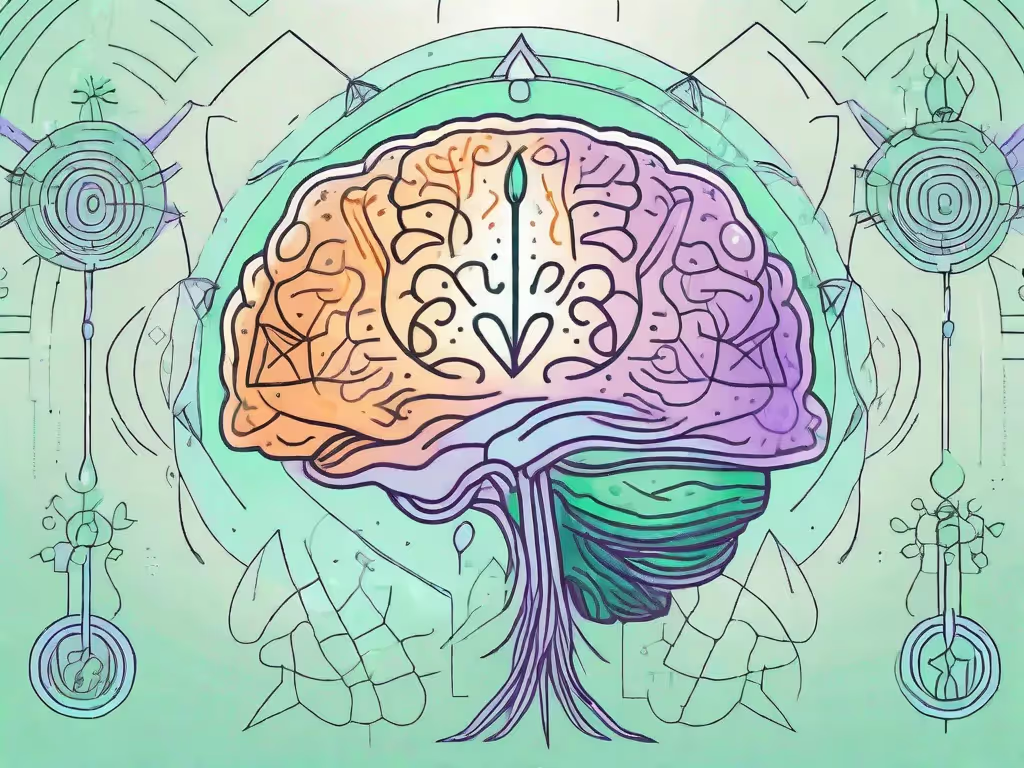Welcome to the world of lucid dreaming! If you've ever wanted to take control of your dreams and experience the impossible, you're in the right place. In this step-by-step guide, we'll explore everything you need to know to start lucid dreaming tonight. Strap in, get comfortable, and let's get started!
Understanding Lucid Dreaming
What is Lucid Dreaming?
Lucid dreaming is the ability to become aware that you are dreaming while you are still in the dream state. This offers the unique opportunity to interact with your dreams, control your surroundings, and even manipulate the elements within it. Lucid dreaming is a powerful tool for exploring your mind, and it can lead to increased creativity, problem-solving abilities, and even personal growth and development.
Lucid dreaming has been practiced for centuries, with early records of it dating back to ancient Tibetan Buddhist texts. It wasn't until the 1970s, however, that lucid dreaming was scientifically studied and recognized as a legitimate phenomenon.
Benefits of Lucid Dreaming
The benefits of lucid dreaming are many. Not only can it be an incredibly fun and exciting experience, but it can also be used for personal growth and development. Lucid dreaming can help you conquer fears, overcome obstacles, and tap into your subconscious thoughts and desires. It can even be used to improve skills, like sports or public speaking. The possibilities are endless!
One of the most fascinating aspects of lucid dreaming is the ability to explore your own mind. You can use lucid dreaming to confront your fears and anxieties, and gain a better understanding of your own psyche. This can lead to increased self-awareness and personal growth.
Common Misconceptions About Lucid Dreaming
There are many misconceptions about lucid dreaming, and it's important to clear them up. For one, lucid dreaming is not inherently dangerous or detrimental to your health. It's simply a different state of consciousness that anyone can experience. Additionally, lucid dreaming is not the same as sleep paralysis, which can be a scary and uncomfortable experience. With the right techniques and practice, anyone can safely experience lucid dreaming.
Another common misconception is that lucid dreaming is only for the spiritually enlightened or those with a natural talent for it. In reality, anyone can learn to lucid dream with practice and dedication. There are many techniques and exercises that can help you achieve lucidity in your dreams, such as reality checks and keeping a dream journal.
Overall, lucid dreaming is a fascinating and rewarding experience that can offer many benefits. Whether you're interested in exploring your own mind, overcoming fears, or just having fun, lucid dreaming is definitely worth exploring.
Preparing for Lucid Dreaming
Lucid dreaming is a fascinating experience that allows you to control and manipulate your dreams. Whether you want to fly, explore new worlds, or confront your fears, lucid dreaming can offer a unique and exciting way to do so. However, achieving lucid dreaming requires some preparation and practice. Here are some tips to help you get started.
Creating a Sleep-Friendly Environment
The first step in preparing for lucid dreaming is to create a sleep-friendly environment. This means making sure that your bedroom is comfortable and conducive to sleep. Start by investing in comfortable bedding that supports your body and helps regulate your temperature. Consider using blackout curtains or an eye mask to block out any light that might disturb your sleep. You may also want to use earplugs or a white noise machine to block out any noise that might keep you awake. Finally, make sure that your bedroom is cool enough to promote restful sleep, but not so cold that you wake up shivering.
If you're having trouble relaxing before bed, you may want to try using essential oils, such as lavender or chamomile, which are known for their calming properties. You could also practice meditation or relaxation techniques to help you drift off to sleep more easily.
Establishing a Consistent Sleep Schedule
Getting enough sleep is crucial for lucid dreaming. Your body needs time to go through all the sleep cycles, including rapid eye movement (REM) sleep, which is where most of your dreams occur. To ensure you're getting enough sleep, establish a consistent sleep schedule. Try to go to bed and wake up at the same time every day, even on weekends. This will help regulate your body's internal clock and make it easier to fall asleep and wake up naturally.
It's also important to make sure that you're getting enough sleep overall. Most adults need between 7-9 hours of sleep per night, so make sure that you're giving yourself enough time to sleep each night. If you're having trouble sleeping, try not to nap during the day, as this can disrupt your sleep schedule and make it harder to fall asleep at night.
Developing a Pre-Sleep Routine
A pre-sleep routine can help your body and mind prepare for sleep and increase the likelihood of lucid dreaming. This could include things like reading a book, taking a warm bath or shower, or practicing relaxation techniques like meditation or yoga. The key is to find activities that help you relax and unwind, so that you're not carrying any stress or tension into your dreams.
You may also want to avoid using electronic devices, such as smartphones or tablets, before bed, as the blue light they emit can interfere with your body's production of melatonin, a hormone that helps regulate sleep. Instead, try reading a physical book or practicing a relaxing activity that doesn't involve screens.
Keeping a Dream Journal
A dream journal is an essential tool for anyone interested in lucid dreaming. Keep a notebook and pen by your bed, and write down any dreams you remember as soon as you wake up. This will not only help you remember your dreams more vividly, but it will also help you identify dream signs, which are events or situations that often occur in your dreams.
By keeping track of your dreams, you can start to recognize patterns and themes that can help you become more aware of when you're dreaming. This, in turn, can help you achieve lucid dreaming more easily.
With these tips in mind, you'll be well on your way to experiencing the fascinating world of lucid dreaming. Sweet dreams!
Techniques for Inducing Lucid Dreams
Lucid dreaming is the ability to become aware that you are dreaming while you are still asleep. It's a fascinating experience that allows you to control your dreams and explore your subconscious mind. While some people are natural lucid dreamers, others need to practice certain techniques to induce lucid dreams. Here are some effective techniques that you can try:
Reality Testing
Reality testing is a technique that involves checking throughout the day whether or not you are dreaming. This can be done by looking at your hands, checking the time, or trying to push your finger through your palm. By performing these tests regularly, you'll be more likely to do them in your dream and realize you're dreaming. This technique is particularly useful for people who have trouble remembering their dreams.
Additionally, practicing mindfulness throughout the day can help you become more aware of your surroundings and increase your chances of realizing you're dreaming.
Mnemonic Induction of Lucid Dreams (MILD)
Mnemonic Induction of Lucid Dreams, or MILD, is a technique that involves setting an intention to realize you're dreaming. Before you go to bed, repeat a phrase like "I will become lucid in my dream," and visualize yourself becoming aware that you're dreaming. This technique is particularly effective for people who have trouble falling asleep or have trouble remembering their dreams.
It's important to note that the key to success with MILD is to truly believe that you will become lucid in your dream. If you doubt yourself, the technique may not work as well.
Wake-Back-to-Bed (WBTB) Method
The Wake-Back-to-Bed Method involves setting an alarm for a few hours before you normally wake up. When the alarm goes off, get out of bed and stay awake for 20-30 minutes before going back to sleep. This can help increase your chances of entering the REM cycle and having a lucid dream.
During the 20-30 minutes that you're awake, you can practice other lucid dreaming techniques, such as reality testing or visualization. This technique is particularly useful for people who have trouble entering the REM cycle or who wake up frequently throughout the night.
Finger-Induced Lucid Dreaming (FILD)
The Finger-Induced Lucid Dreaming technique involves gently moving your fingers as you fall asleep. Focus on the sensation of your fingers moving, and imagine yourself in a dream. With practice, you may find yourself becoming aware that you're dreaming while still feeling the sensation of your fingers moving.
This technique is particularly effective for people who have trouble falling asleep or who wake up frequently throughout the night. It's important to note that you should not move your fingers too much, as this can disrupt your sleep.
Dream-Exit Induced Lucid Dreaming (DEILD)
The Dream-Exit Induced Lucid Dreaming technique involves waking up from a dream, and immediately trying to re-enter the same dream. As you fall back asleep, focus on the dream you just had, and imagine yourself becoming aware that you're dreaming. With practice, you may find yourself slipping back into the same dream, but with the ability to control your surroundings.
This technique is particularly useful for people who have frequent nightmares or who wake up frequently throughout the night. It's important to note that you should not force yourself to wake up from a dream, as this can disrupt your sleep.
Overall, lucid dreaming is a fascinating experience that can help you explore your subconscious mind and gain insight into your thoughts and feelings. By practicing these techniques regularly, you can increase your chances of having a lucid dream and enjoy all the benefits that come with it.
Lucid dreaming is an exciting and rewarding experience, but it takes practice and patience to achieve. By following these steps, you'll be well on your way to becoming a lucid dreamer. Remember to be patient with yourself, and don't get discouraged if it takes a few tries. With time and effort, you'll soon be controlling your own dreams, and experiencing things you never thought possible. The world of lucid dreaming is waiting for you!



.webp)






.avif)

%20(1).avif)


.avif)
.avif)
.webp)


.avif)


















































































































.avif)

















.svg)









